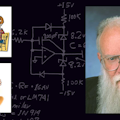I got to know him because I could always use a little help in choosing good new components. Also, he could help me avoid making stupid choices of bad components. He could even help me find new components that were cheaper or smaller or better that would have taken a lot of work to research. My old boss Dave Ludwig had hired Bob for Nexus for just those reasons. And, darn, they were good reasons.
I worked with Bob for about seven years, and he was in the adjacent office. He wasn’t helpful every day, after the dust settled. But every week or two, I might have a really serious need for help choosing some components, and Bob was always helpful. Or, if he didn’t have an answer already figured out, he could go out and do some evaluations, and in a week or two, he could get me some good advice. Or he might get that result quickly because he knew where to ask around. And Bob said I was often helpful to him, because I had innovative ways to make measurements of components he was interested in. We did a lot of good components engineering together.
MORE RECENTLY
Recently, some guy asked on a net discussion, “How do you find out about new electronic components?” Many people had good ideas, and other engineers warned about bad ideas. If you listen to a sales rep pitch his latest products, he will show you what he is interested in selling. Unless you’re interested in them too, you’ll just waste your time.
Likewise, there is almost no limit to the amount of time you can waste on the Web looking for components that are there—not to mention, things that aren’t there. I have found that some search engines and “filters” aren’t linear. If you ask for some features or specs first, you may get to the part you want. If you ask in a different sequence, it may tell you there’s no such thing! No, computers aren’t always helpful.
On rare occasions, I’ll talk to sales reps about a pretty good old product, and they will ask, “Are you interested in a greatly improved version? We have one coming out soon.” I recently wanted info on that very new and improved product, so it was a good fit. But if you aren’t pretty careful, you can waste a lot of time on the guy’s new whiz-bang products that you really have no interest in, and won’t for years!
But some news releases from manufacturers or distributors tell you they can steer you to the latest, greatest, newest products. Yeah, and sometimes they’re so new, they don’t have good information, decent literature, a fair price, or any reasonable availability.
So, no, I’m generally not interested in “the latest, greatest newest products.” I’m usually more interested in consistent, available products. Preferably from multiple sources. Note that it’s not just software that can act as “vaporware.”
Sometimes, a helpful sales engineer won’t have what you need, but he can tell you where to look for it. I try to do that, if somebody asks me for a product I don’t have. Sometimes, asking a buddy will help you find what you want. Asking around can sometimes be helpful. However, asking for a selected part with somewhat tighter specs can sometimes get you in trouble, and I like to avoid that. Even if the yield starts out okay, it can degrade and leave you in the lurch.
NEW PROJECT, NEW NEEDS
I’m working on a new precision power project. I’ll tell you more about it in a few months. But while some precision parts cost a good bit of dough, others don’t. For example, a Trarlington (as I’ve already told you, 1.5 × a Darlington) that can pass a few milliamperes with an alpha within 1 ppm of 1.000000 costs a couple dimes. But when a similar transistor circuit has to pass 5 A, it can add up to a few bucks.
I can design some very elegant circuits to provide excellent precision, using mostly components that are 15 or 25 years old. Still, there are a few places where I need some really good parts that I couldn’t buy 10 or five years ago. So, I’m doing some careful searching to get good components and to find components with plausible second sources.
Anyhow, if I had access to a few hours of a good component engineer’s time, it might save me some worry, time, or grief. But this application is so simple and basic, I think I’m doing okay. More on this later.
Comments invited! [email protected] —or:
R.A. Pease, 682 Miramar Avenue
San Francisco, CA 94112-1232
Bob Pease obtained a BSEE from MIT in 1961 and was a Staff Scientist at National Semiconductor Corp., Santa Clara, Calif.
About the Author

Bob Pease
Bob obtained a BSEE from MIT in 1961 and was a staff scientist at National Semiconductor Corp., Santa Clara, CA, for many years. He was a well known and long time contributing editor to Electronic Design.
We also have a number of PDF eBooks by Bob that members can download from the Electronic Design Members Library.
